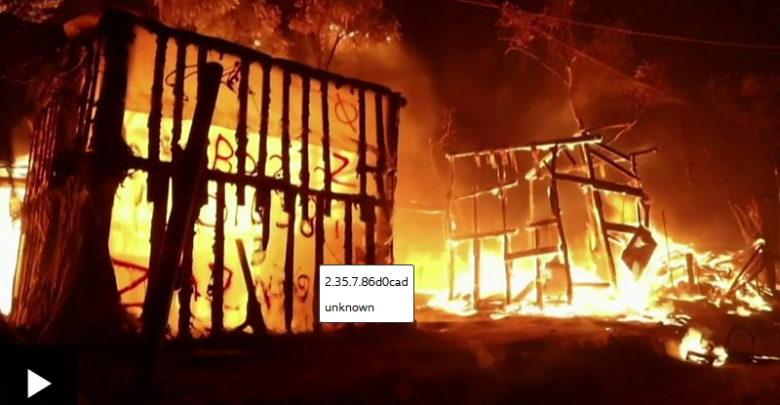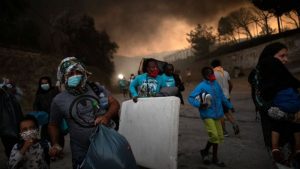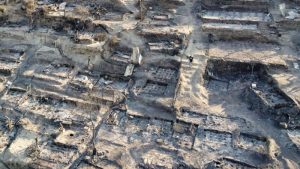InternationalNews
Moria migrants: Greek camp fire sparks race to find shelter for 13,000

Greece is in a race to find shelter for thousands of migrants forced to flee an overcrowded camp on the island of Lesbos that has been destroyed by fire.
The blaze ripped through the Moria camp late Tuesday, with another fire wiping out any remaining tents on Wednesday.
Greek officials said many of the 13,000 migrants who lived in the camp would be temporarily placed on ships at a nearby port or in tents flown in from Athens.
About 400 teenagers and children have been transferred to the mainland.
But Greek Migration Minister Notis Mitarachi told the BBC that about 2,000 people might not have access to a shelter and authorities were working to provide emergency accommodation near the Moria camp site.
“Hopefully by midnight or in the early hours of the morning, most people will have a replacement tent offered,” he said, adding that “vulnerable people and families” were being taken to the port city of Mytilene, where they could sleep on specially provided ships.
He added that their had been “no casualties, no loss of life” and that some people were returning to “safe areas” near the Moria camp, which was only designed to hold 3,000 people.
Fires broke out in more than three places in a short space of time, local fire chief Konstantinos Theofilopoulos told state television channel ERT. Some protesting migrants hindered firefighters who tried to tackle the flames, he said.
The main blaze, which was initially fanned by high winds, was put out by Wednesday morning. Some 20 firefighters, 10 fire engines and a helicopter were sent to the scene.
The incident occurred just hours after reports that 35 people had tested positive for Covid-19 at the Moria camp. Authorities placed the facility under quarantine last week after a Somali migrant was confirmed to have contracted coronavirus.
Mr Mitarachi said the fires “began with the asylum seekers because of the quarantine imposed”. Some of those infected with the virus had reportedly refused to move into isolation with their families.
Mr Mitarachi did not say, however, that the fires were a deliberate act of arson aimed at destroying the camp.
But some migrants told BBC Persian that the fire had broken out after scuffles between migrants and Greek forces at the camp.
Several blamed “far-right Greeks” for the blaze after the announcement of coronavirus cases, and took photos of what they said were canisters used to ignite the flames.
Many migrants then attempted to carry their belongings to the port town of Mytilene, but police had blocked roads. Others were reportedly attacked by locals as they tried to pass through a nearby village.
The mayor of Mytilene, Stratis Kytelis, said it was “a very difficult situation because some of those who are outside will include people who are positive [for coronavirus]”.
Reports suggest many slept in fields after the fire.
A state of emergency has been declared and several ministers have been sent to Lesbos to assess the situation.
Greek Prime Minister Kyriakos Mitsotakis said “the situation in Moria cannot go on, because it is simultaneously a public health and national security issue”.
The EU has offered to help with the response.
European Commission President Ursula von der Leyen said the main priority was “the safety of those left without shelter”.
German foreign minister Heiko Maas described the blaze as a “humanitarian disaster” and tweeted about “the distribution of refugees among those willing to accept admission in the EU”.

Prime Minister of the German state of North Rhine-Westphalia, Armin Laschet, later offered to “take in 1,000 refugees”.
The Moria Refugee Camp lies north-east of Mytilene, the capital of Lesbos. It has been overwhelmed by huge numbers of refugees for years.
According to InfoMigrants, about 70% of people in the camp are from Afghanistan but migrants from more than 70 different countries live there.
An overflow site – the Kara Tepe Refugee Camp – has since been built but there is still not enough space to accommodate all arrivals.
For years, thousands of people who arrived on Lesbos were placed in the camp and could not leave until their asylum application was processed on the mainland – a slow, bureaucratic process.

The EU has tried to resettle migrants among different member states but governments across the bloc have rejected different proposals, and migrants have waited in squalid conditions.
In April, Human Rights Watch said the Greek authorities had not done enough to tackle “acute overcrowding” at the site, warning it was not prepared for an outbreak of coronavirus.
The Greek government plan to build closed detention sites to house migrants on the Greek islands. Protesters on Lesbos attacked authorities in February who brought construction equipment to the island.
Source:Fiilafmonline/BBC


